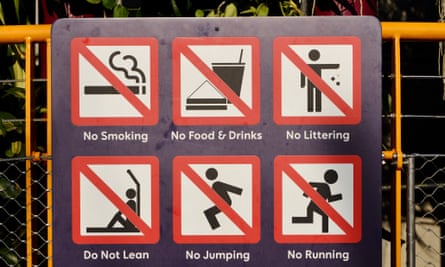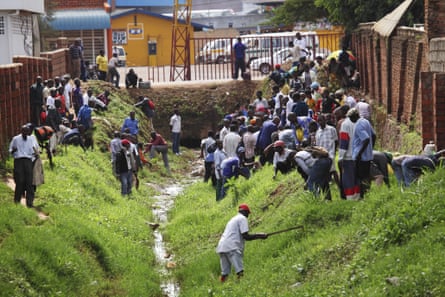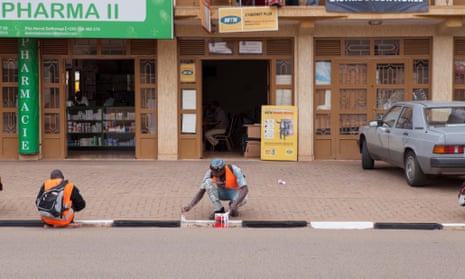Definitions of cleanliness can, of course, be very different across the world. I’ve seen people spitting on pristine streets in China, and broken pots left to decay neatly by the roadside in Africa. Monaco provides dispensers with free bags for cleaning up after your dog, but some visitors are surprised to see the used bags just lying in the gutter. This however is the Monegasque way: they must wait there until collection.
According to the 2014 Mercer Global Financial list of the world’s cleanest cities, Calgary, Canada’s oil capital was top of the cleanliness pile, followed by Adelaide, Honolulu, Minneapolis and Kobe.
To anyone who travels much to Europe, it might seem odd there’s not a single Swiss city in the top 10. Ultra-calm Zurich has been Mercer’s second-best city for quality of life for years (Calgary comes in a lowly 33rd in the life stakes) but it figures nowhere on the cleanliness list.
The Mercer study is based on five hygiene-based factors: the availability and drinkability of water, waste removal, quality of sewage systems, air pollution, and traffic congestion. Curiously litter, a very visible indicator of cleanliness, is not considered at all.

To be fair, Calgary can also boast litter-free streets. Thousand-dollar fines for dropping cigarette butts or throwing rubbish out of a car window have had a positive impact on the city. But for Mercer, Calgary ranks top of the list due to its green initiatives. As well as following Alberta’s Too Good to Waste programme, which aims to decrease how much waste is sent to landfill, environmental charity Green Calgary also promotes a greener lifestyle for Calgarians by offering tips on everything from improving your composting to how to pack a litter-less lunch. The organisation, which has been in operation since 1978, also “seeks to empower Calgarians to create healthy homes and communities through environmental education, products and services”. By 2020 the city intends to divert 80% of its waste away from landfills.
Yet when it comes to awarding marks for effort, spotless Singapore really should score high on any list given the way it enforces cleanliness and tidiness. The island city-state has draconian laws about many things, from pornography to tipping. In the 1960s, Prime Minister Lee Kuan Yew introduced strict anti-litter laws, which are still in force today.

Anyone convicted of dropping litter can be fined up to S$1,000 (£480) for the first conviction. Repeat convictions cost up to $5,000, and may lead to a community service orders or anti-littering lectures (only given in Chinese), to curb repeat offenders. In the case of a third offence, law-breakers may be made to wear a sign reading “I am a litter lout”.
Singapore also fines people for putting spent chewing gum anywhere other than a bin ($100), for urinating in lifts ($500), and for failing to flush a public lavatory ($100). Spot checks are regularly made by police officers in public toilet cubicles – there is no point having a law if it’s not enforced.
The result of these fines is plain to see: Singapore is a very clean and tidy island state, albeit one that has also sacrificed certain civil liberties (and, perhaps, a certain amount of creativity). That said, it would take a very dyed-in-the-wool libertarian to fight for the right to pee in an elevator.
There are less punitive ways to be clean and tidy, however. Kigali, the capital of Rwanda, seems to have achieved a clean and litter-free environment without the threat of harsh fines. Not on any of Mercer’s lists, modern Kigali isn’t exactly beautiful. It rises up on a tree-covered slope and is mainly built of concrete, but the level of upkeep is extraordinary.
Indeed, the city’s roundabouts are so well-swept and the grass so well-maintained that wedding couples sprint across the traffic to be photographed in the middle of them. Unusually, this has been achieved not through punishment, but by the principle of Umuganda. This word has many meanings relating to “community” and “payment”, and dates back before Rwanda was part of Belgium’s African empire.
In the 19th century, a number visitors recorded that Rwandans were required to work two days a week for their community leader and during Belgian rule Umuganda was encouraged as a way of bolstering civic responsibility. In the years before the 1994 genocide, President Juvénal Habyarimana emphasised it as part of his concept of “true” Rwandan identity. “True Rwandans” provided free labour for state-led projects like school building, road works, the construction of sanitation facilities and digging of anti-erosion ditches. Unfortunately Habyarimana’s true Rwandans, by extension, also belonged to the Hutu tribe, and Umuganda eventually became caught up in ideas of racial purity.
After taking office in 2000, President Paul Kagame harnessed Umuganda to help clean up his gun and shell-strewn capital, as well as to promote the idea of a cohesive national identity through communal projects. Under Kagame, Umuganda was formalised as a collective event on the last Saturday in each month when traffic – including airport taxis – is stopped for three hours in the morning, and the city comes together to tidy up. This can be problematic if you have a flight to catch. This day is called umunsi w’umuganda (contribution made by the community) and all able-bodied people between the ages of 18 and 65 are required by law to participate. The knock-on effect of such conscientious cleaning up is, of course, that people are less inclined to drop litter in the first place.

Significantly, although President Kagame is known for his toughness, no one I spoke to in Kigali was aware of penalties for dropping litter in their city. It simply is not something that occurs. People will tell you with great pride that their city is “cleaner than New York and London”, and the army of poorly-paid female cleaners who seek out litter and tend the grass consider this work their patriotic duty.
“When foreign people come to this city and later return to their countries exclaiming about our city’s cleanliness, that itself motivates me to keep doing my work even better,” says Théodosia Vuganeza of the Ikondera Women’s Cleaning Cooperative.
The mayor of Kigali is now introducing cleanliness and hygiene awareness lessons into primary schools, taking his cue from President Kagame’s assertion that Kigali does not need international aid “to keep its backyards clean”.
The cleanliness of Kigali is a pleasing rebuttal to Forbes’ list, which declared in 2007 that the cleanest cities in the world were “largely located in countries noted for their democracy and their industrialisation” and that there are “no top-25 clean cities in South or Central America, Africa and Australia”. The magazine concluded “clean may also mean well-off”.
But in less affluent countries, voluntary clean-ups may be the coming thing. Dar es Salaam in Tanzania is one of 91 cities worldwide to take part International Coastal Cleanup Day, which involved ridding beaches of litter and waste. The Dominican Republic and Puerto Rico, neither of them wealthy states, are also among the list of countries playing a key role in the coastal cleanup. This year’s volunteers cleared 16 million pounds of garbage from beaches around the world.
So, if Singapore is proof that cleanliness can be achieved by legislation, Kigali and Dar es Salaam are definitely proof that motivation and communal spirit can work as well. Calgary, on the other hand, falls somewhere between the two. It’s also the least interesting of the three cities to visit – but that’s a whole other list.
Finally one has to ask, does it matter? Last year a Ugandan looking at Kigali told me wistfully that Kampala used to be as pristine as Kigali: “Why can’t we keep our capital clean and tidy anymore?”
So, if you live there I think it matters, very much.

Comments (…)
Sign in or create your Guardian account to join the discussion